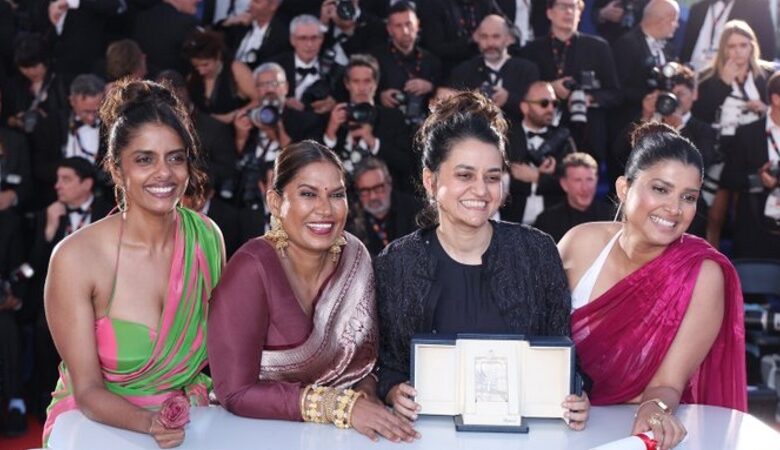Indian Cinema Shines at Cannes: A New Era of Recognition and Opportunity

News Mania Desk/Agnibeena Ghosh/3rd June 2024
“Please don’t wait 30 years to bring another Indian film to Cannes,” was Indian filmmaker Payal Kapadia’s heartfelt plea while accepting the Grand Prix for her film ‘All We Imagine As Light’. Her words resonate strongly, especially given the significant presence of Indian films at this year’s Cannes Film Festival.
Veteran cinematographer Santosh Sivan, renowned for his work in ‘Dil Se’ and ‘Roja’, became the first Asian filmmaker to receive the prestigious Pierre AngenieuxExcelLens award for career achievement in cinematography. Meanwhile, Sandhya Suri’s ‘Santosh’ was featured in the prestigious Un Certain Regard section, highlighting the diverse storytelling emerging from India.
Karan Kandhari’s satire ‘Sister Midnight’, which explores the complexities of modern arranged marriages, was selected for the Directors’ Fortnight. Additionally, Maisam Ali’s ‘In Retreat’ became the first Indian feature to be showcased in ACID, a parallel program at Cannes devoted to independent films. Lauding Kapadia’s film, a New York Times essay noted that it “reflects a growing recognition of the independent cinema made in the shadow of the country’s mainstream hits”.
Shaunak Sen, director of ‘All That Breathes’, which won top documentary awards at Sundance and Cannes in 2022, observes a growing curiosity about Indian cinema. “Producers have inquired about feature film projects too. There are more mentorship labs than before. Indian filmmakers are also getting more adept at figuring out how to bring together a patchwork quilt of funds from different countries,” he says.
Meenakshi Shedde, in charge of South Asia programming for the Berlin, Toronto, and Mumbai film festivals, notes a growing awareness that Indian cinema extends beyond Bollywood’s song-and-dance spectacles and Satyajit Ray’s realism. “Not just Indian filmmakers, ‘India stories’ directed by NRIs and foreign directors are also making waves. We had about 14 films that showcased such stories in Toronto last year, which is historic for an A-list festival,” she adds.
This trend is evident in the success of feature films as well. At this year’s Sundance, Shuchi Talati’s directorial debut ‘Girls Will Be Girls’, co-produced by childhood friend and actor Richa Chadha, won the audience award in the world cinema dramatic category. Kanu Behl’s ‘Agra’, a film exploring sexual repression in India, has been screened at Cannes and Busan, among other festivals. The high-octane action film ‘Kill’, produced by Dharma Productions and Guneet Monga, has been featured at New York’s Tribeca Film Festival and the Toronto Film Festival.
ArfiLaamba, co-founder of Bombay Berlin Film Productions, emphasizes the importance of blending local realities with global issues. “We are standing on the shoulders of many independent filmmakers who took their films to different festivals, even if they didn’t get recognition,” he says. Laamba highlights themes such as migration, women’s solidarity, class differences, and climate change that resonate well with global audiences, aided by the availability of diversified OTT content from India.
Most successful Indian films at international festivals have been co-productions involving multiple countries. Kapadia’s film, for instance, had producers and funds from France, India, the Netherlands, Luxembourg, and Italy. A small French company, Petit Chaos, played a crucial role in co-producing her documentary on student protests in India, ‘The Night of Knowing Nothing’, which won the ‘Golden Eye’ award for best documentary at Cannes in 2021.
Thomas Hakim of Petit Chaos and Zico Mathew of Chalk and Cheese in India were pivotal in producing ‘All We Imagine As Light’. “We all brought our skills to try and make the best film possible and I think we learnt a lot from each other,” they said in an email response. They emphasized the importance of trust and effective communication in co-productions, noting that a well-crafted partnership can significantly enhance the quality of a film.
Meenakshi Shedde adds that involving European producers can significantly reduce the burden on Indian filmmakers. “They already know which funds and festivals to apply for. If that producer also has a fantastic history at the festival, the project will be taken more seriously. Half the battle’s won there,” she explains.
Shaunak Sen agrees, noting that working with experienced producers can professionalize the filmmaking process, though much still depends on the filmmaker’s own resourcefulness.
Recognition for Indian independent films has come at a time when international film festivals are increasingly focusing on diversity. In 2022, Cannes had its first woman president, Iris Knobloch, and this year’s jury for the official competition was headed by ‘Barbie’ director Greta Gerwig. Monica Gyamlani, who has worked as a film programmer and screener at Sundance and the Dharamshala International Film Festival, emphasizes the growing inclusion of South Asian directors and actors, which helps to remove barriers for stories that focus on non-White populations.
Film festivals are also creating specific sections to promote younger and more experimental filmmakers. For instance, Un Certain Regard at Cannes showcases films with unusual stories and non-traditional styles, while ACID focuses on independent films. There are also mentorship labs and grants specifically catering to women and indigenous filmmakers.
Indian cinema is experiencing a remarkable transformation, gaining unprecedented recognition and opportunities on the global stage. The increasing presence of Indian films at prestigious festivals like Cannes is a testament to the diverse and evolving storytelling landscape in the country. As more filmmakers explore co-productions and international collaborations, the future of Indian cinema looks brighter than ever.






